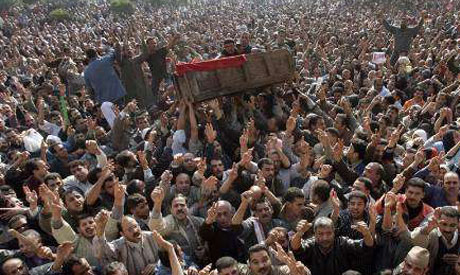
Mahalla workers on strike. The photo is from a previous strike. (Reuters)
Workers at Egypt's biggest public textile company, Weaving and Textile Company in Mahalla, went on strike on Monday as the government delayed the payment of the last installment of the yearly bonus. The workers are also demanding the implementation of a minimum wage of LE 1,200 as well as the dismissal of Fouad Abdel-Alim, the head of the Holding Company for Weaving and Spinning, which oversees all public sector textile firms.
More than 10,000 workers of the morning shift started the strike; 2,000 workers of the evening shift joined them. "We have been told that the bonus installment would be paid in two weeks, but there is no official statement," Kamal Al-Fayoumi, a worker who has become a well-known figure after playing a key role in strikes staged before Mubarak’s ouster, told Ahram Online.
Abdel-Alim told Ahram Online that a ministerial economic group will grant the workers the delayed installment and that an official decision would be announced soon. Al-Fayoumi said that the administration told them that the minimum wage would be applied to the company's workers once the National Council for Wage made a final decision. "We will make a final decision whether to go on striking or to end it Tuesday morning when more workers will be present," he said.
The workers concluded an agreement last year with the government that stipulates a profit-sharing bonus payment paid in installments and distributed equally to employees of the Holding Company for Weaving and Spinning, which includes all workers in the public textile sector, not only those of Mahalla. The delayed installment was supposed to be paid by the end of 2013.
Workers in the Nile Delta city of Mahalla, with a long tradition of organised action, have led many strikes before and after the 25 January 2011 uprising. They commenced a wave of labour action in 2006, and again in 2008. In that year Mahalla became home to the largest anti-regime protests of the 30-year Mubarak era before 2011.Beginning as a workers' strike, protests grew into a widespread struggle following clashes with security forces. For the first time images of a tarnished, trampled upon poster of Mubarak circulated on the Internet, signaling the beginning of the fall of Egypt’s then-feared dictator.


.jpg)


No comments:
Post a Comment